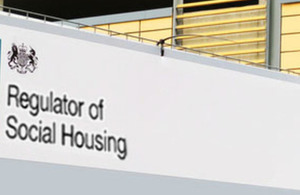Latest financial results show continued strength of social housing sector despite challenges
Press release
The latest Quarterly Survey published by the Regulator of Social Housing indicates good financial position for social housing sector.

The Regulator of Social Housing has today (1 December) published the results of its latest quarterly survey of registered providers’ financial health. The report covers the period from 1 July 2020 to 30 September 2020.
The sector remains financially strong with access to sufficient finance. Performance in the quarter continues to reflect some of the challenges arising from the coronavirus pandemic. However, the sector retains a good financial position overall.
The sector has good access to finance with total cash and undrawn facilities totalling £34.7 billion at the end of the quarter. During the quarter, new facilities totalling £4.5 billion were arranged by 44 providers, with £1.2 billion of that relating to the COVID Corporate Financing Facility.
Development spending in the quarter increased from the previous quarter as restrictions on construction sites were removed, but is still 18% lower than in the same quarter of the previous year. Current asset sales in the quarter totalled £1.0 billion; 23% higher than the forecast.
The coronavirus restrictions and associated increase in unemployment continues to affect arrears and void loss figures, though not to the extent anticipated in June. Rent collection rates have increased to a level more consistent with normal seasonal trends, with underlying cashflow performance remaining strong.
Forecasts for the next 12 months indicate that performance and plans are beginning to return towards levels seen before the coronavirus pandemic. Forecast major repairs spend is now back in line with December 2019 projections and forecasts for both sales receipts and development expenditure have increased since June. While encouraging, these forecasts are clearly subject to change as the COVID situation develops.
Will Perry, Director of Strategy at RSH said:
The social housing sector continues to maintain a good financial position with forecasted improvement. Considerable challenges still remain, and providers will need to manage risk effectively to ensure that they can maintain services to tenants and plan and invest for the future.
Notes to editors
-
The quarterly survey provides a regular source of information regarding the financial health of private registered providers, in particular with regard to their liquidity position.
-
The quarterly survey returns summarised in the report cover the period from 1 July 2020 to 30 September 2020 and the latest report is based on regulatory returns from 214 PRPs and PRP groups who own or manage more than 1,000 homes. The survey Data about income collection, including rent collection, was first collected in 2013.
-
The Regulator of Social Housing promotes a viable, efficient and well-governed social housing sector able to deliver homes that meet a range of needs. It does this by undertaking robust economic regulation focusing on governance, financial viability and value for money that maintains lender confidence and protects the taxpayer. It also sets consumer standards and may take action if these standards are breached and there is a significant risk of serious detriment to tenants or potential tenants.
-
For press office contact details, see the Media enquiries page. For general queries, please email enquiries@rsh.gov.uk or call 0300 124 5225.
Published 1 December 2020